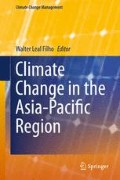Abstract
This paper assesses that millions of persons are displaced annually in the Asia and Pacific region due to large concentrated populations residing in areas exposed to environmental risks. Some of those displaced end up becoming migrants, establishing their home in a new location. Migration influenced by environmental factors is contributing to the urbanization trend in the region. Displacement and migration are expected to increase in the coming years due to the impacts of climate change, and the increasing number of people residing in areas at risk of extreme environmental events or slow-onset phenomenon, such as rising sea levels. In addressing environmentally driven migration, a key policy aim should be to curtail the likelihood of forced displacement. “Climate proofing” of physical infrastructure and government support to vulnerable and poor populations can strengthen resilience. Although environmentally driven migration generally unfolds within a country’s borders, it can also take on an international character. For this reason, governments need to collaborate in tackling this challenge. If the threat of environmentally driven migration is properly managed and planned, benefits can accrue to migrants, host communities, and communities of origin.
Access this chapter
Tax calculation will be finalised at checkout
Purchases are for personal use only
Notes
- 1.
“Resilience” is the ability of countries, communities, businesses, and individual households to resist, absorb, recover from, and reorganize in response to natural hazard events, without jeopardizing their sustained socioeconomic advancement and development (ADB 2013b).
- 2.
The figure includes weather-related events which displaced at least 100,000 people. Source: IDMC annual estimates of displacement due to disasters: http://www.internal-displacement.org/publications.
- 3.
Kiribati, Samoa, Tonga, Tuvalu, and Vanuatu.
References
ADB (2012) Addressing climate change and migration in Asia and the Pacific. Manila
ADB (2013a) Climate-related disasters in Asia and the Pacific. ADB Economics Working Paper Series, No. 358. Manila
ADB (2013b) Investing in resilience: ensuring a disaster-resistant future. Manila
ADB (2013c) Moving from risk to resilience: sustainable urban development in the Pacific. Manila
Asian Development Bank (ADB) (2010) Ho Chi Minh City—adaptation to climate change summary report. Manila
Barnett J, Chamberlain N (2010) Migration as climate change adaptation: implications for the Pacific. In: Burson B (ed) Climate change and migration—South Pacific perspectives. Institute of Policy Studies, Wellington
Barnett J, Webber M (2010) Accommodating migration to promote adaptation to climate change. The World Bank, Washington, DC
Bedford R (2000) Meta-societies, remittance economies and Internet addresses of contemporary human security in Polynesia. In: Graham D, Poku N (eds) Migration, globalization and human security. Routledge, London and New York
Birkmann J et al (2010) Adaptive urban governance: new challenges for the second generation of urban adaptation strategies to climate change. Sustain Sci 5:201
Cruz RV, Harasawa H, Lal M, Wu S, Anokhin Y, Punsalmaa B, Huu Ninh N (2007) Chapter 10: Asia. In: Parry ML, Canziani OF, Palutikof JP, van der Linden PJ, Hanson CE (eds) Climate change 2007: impacts, adaptation and vulnerability: contribution of working group II to the Fourth Assessment Report of the Intergovernmental Panel on Climate Change. Cambridge University Press, Cambridge, UK
Dadush U (2013) The effect of low-skilled labor migration on the host economy. Washington, DC. Global Knowledge Partnership on Migration and Development, World Bank
Foresight (2011) Migration and global environmental change. Final project report. The Government Office for Science, London, United Kingdom
Gibson J, McKenzie D, Halahingano R (2013) Development impacts of seasonal and temporary migration: a review of evidence from the Pacific and Southeast Asia. Asia Pacific Pol Stud 1(1):18–32
Intergovernmental Panel on Climate Change (IPCC) Working Group II (2013) Fifth assessment report, Chapter 24—Asia (final draft). Stanford, CA
Intergovernmental Panel on Climate Change (IPCC) Working Group II (2014) Fifth assessment report, summary for policy makers: Climate change 2013: impact, adaptation, and vulnerability. Stanford, CA
Internal Displacement Monitoring Centre (IDMC) (2013) Disaster-induced internal displacement in the Philippines—the case of tropical storm Washi/Sendong. Geneva.
Internal Displacement Monitoring Centre (IDMC) (2014) Global estimates 2014: people internally displaced by disasters. Geneva
Johnson CA, Krishnamurthy K (2010) Dealing with displacement: can “Social Protection” facilitate long-term adaptation to climate change? Glob Environ Change 20(4):648–653
Lilleor HB, Van den Broeck K (2011) Drivers of migration and climate change in less development countries. Glob Environ Change 21(Suppl):S70–S81
Newland K (2011) Climate change and migration dynamics. Migration Policy Institute, Washington, DC
Scherr J (2014) Slum dwellers face climatic disasters. Natural Resources Defense Council Staff Blog (http://switchboard.nrdc.org/blogs/jscherr/slum_dwellers_face_climatic_di.html)
United Nations Department of Economic and Social Affairs (UNDESA) (2012) World urbanization prospects the 2011 revision. United Nations, New York
United Nations International Strategy for Disaster Reduction (2011) Strengthening climate change adaptation through effective disaster risk reduction. Briefing Note 03. UNISDR, Geneva, Switzerland.
Warner K, Afif T (2013) Where the rain falls: evidence from 8 countries: how households use content and erosive migration to manage the risk of rainfall variability and food insecurity. Climate and development. Taylor and Francis, London
Wheeler D (2011) Quantifying vulnerability to climate change: implications for adaptation assistance. Center for Global Development, Washington, DC
Yuen B (2014) Migration and slums in urban Asia. In: Chatterjee S (ed) Ending Asian deprivations: compulsions for a fair, prosperous and equitable Asia. Routledge, New York
Author information
Authors and Affiliations
Corresponding author
Editor information
Editors and Affiliations
Rights and permissions
Copyright information
© 2015 Springer International Publishing Switzerland
About this chapter
Cite this chapter
Édes, B.W., Gemenne, F. (2015). Managing Environmental Migration to Improve Economic and Social Outcomes in Developing Asia and Pacific. In: Leal Filho, W. (eds) Climate Change in the Asia-Pacific Region. Climate Change Management. Springer, Cham. https://doi.org/10.1007/978-3-319-14938-7_7
Download citation
DOI: https://doi.org/10.1007/978-3-319-14938-7_7
Publisher Name: Springer, Cham
Print ISBN: 978-3-319-14937-0
Online ISBN: 978-3-319-14938-7
eBook Packages: Business and EconomicsEconomics and Finance (R0)

